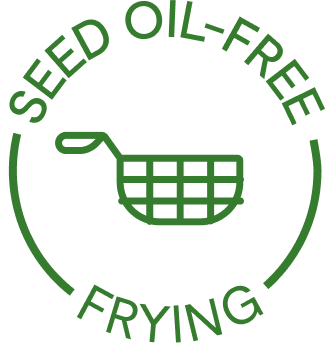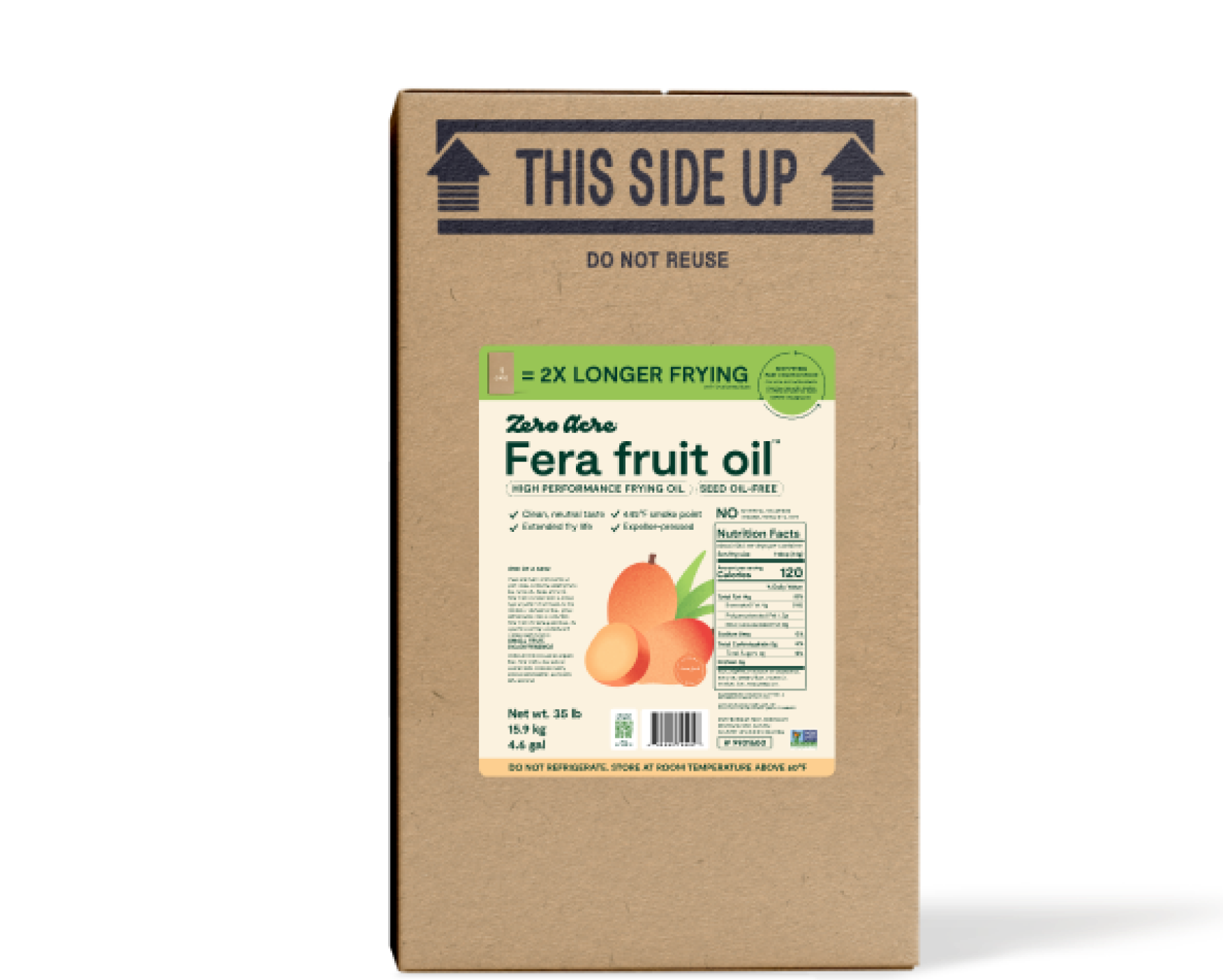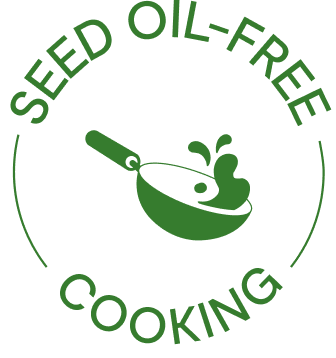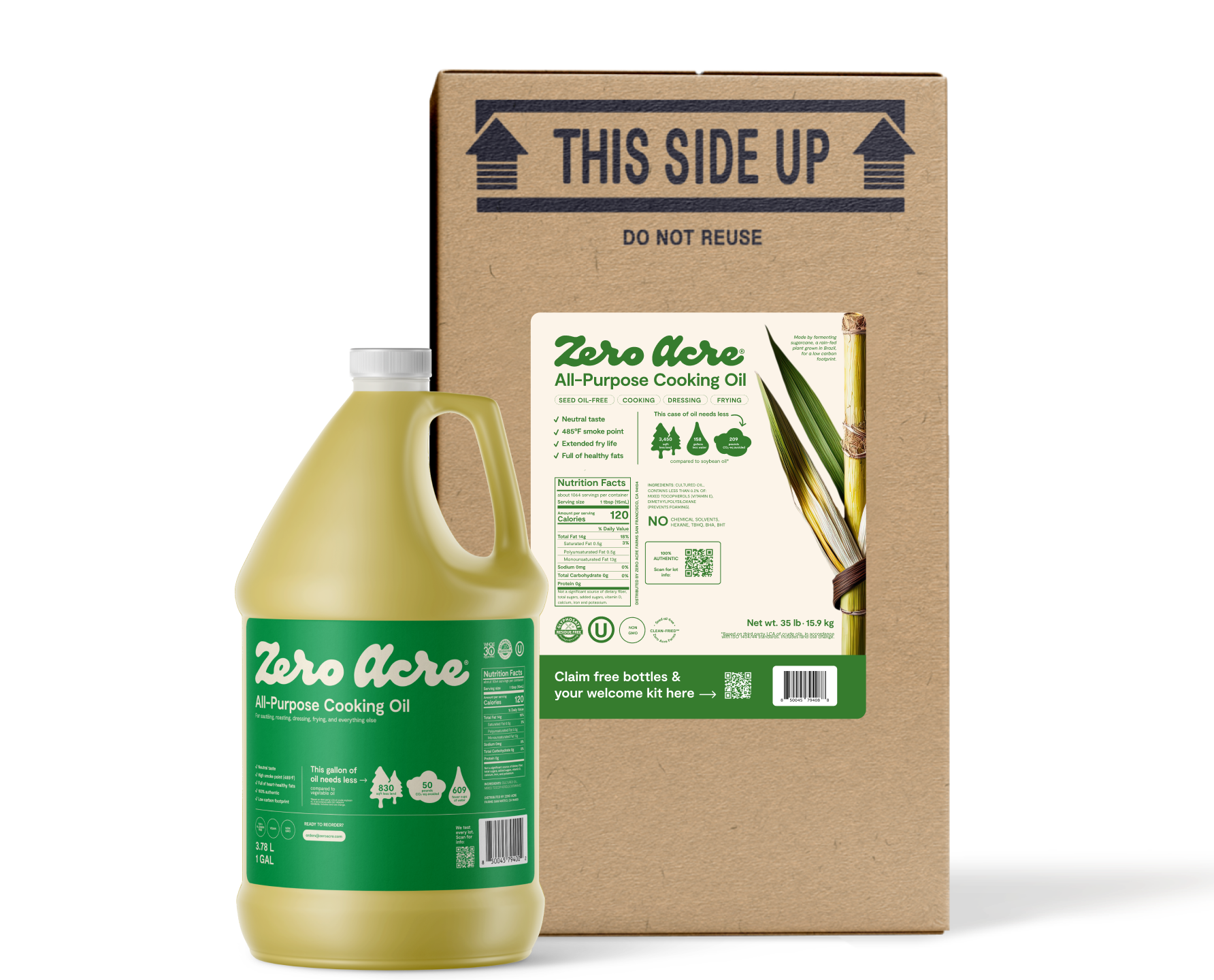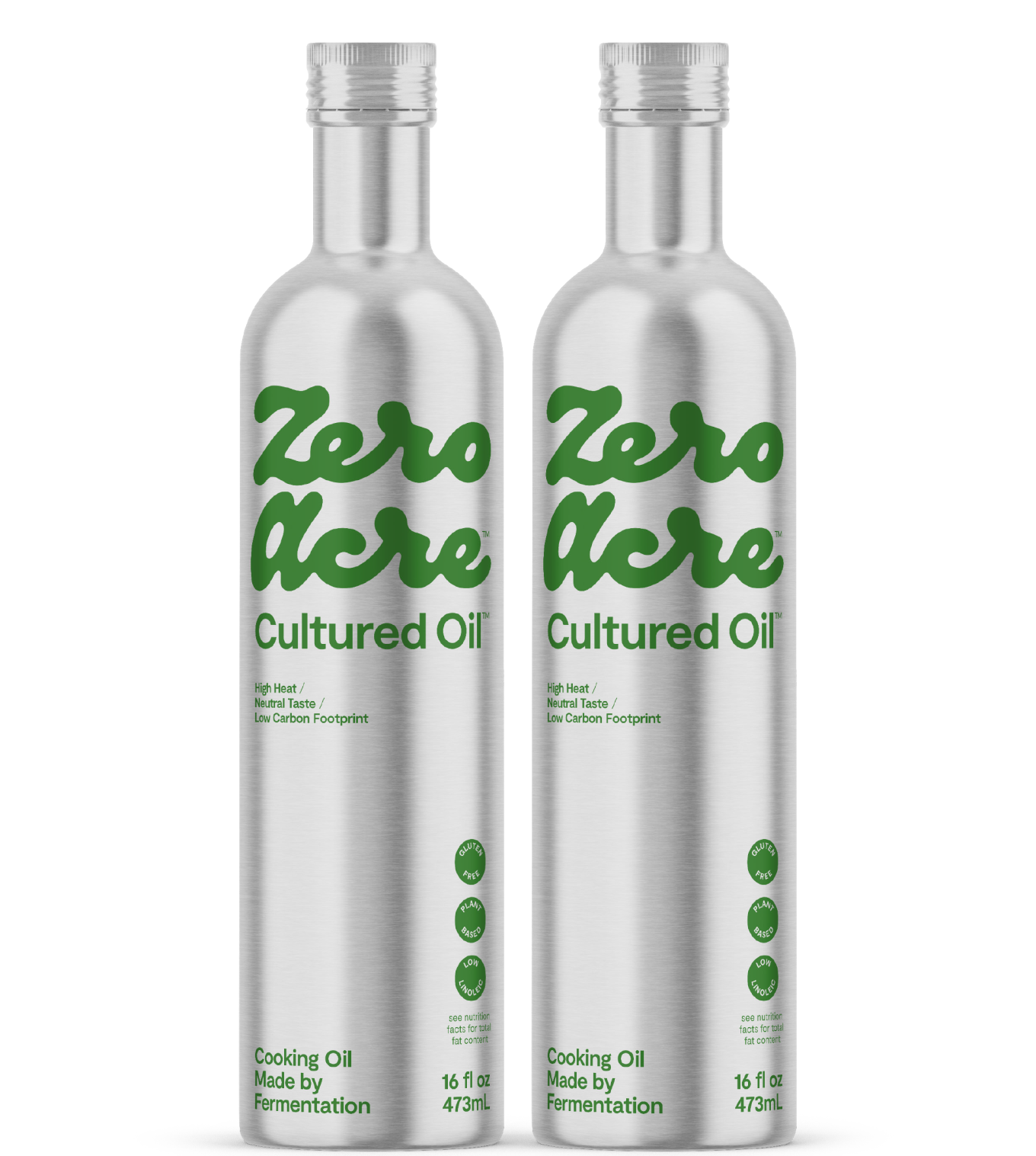WRITTEN BY: The Zero Acre Editorial Team
Article at a Glance
Most people like to add creamer to their coffee for flavor and to help balance out the bitter taste of black coffee.
Many conventional non-dairy coffee creamers contain hidden vegetable oils, added sugars, synthetic flavors and thickening agents which may undermine the research-backed health benefits of coffee.
Making coffee creamer at home is simple and easy, and allows you to control the ingredients you use.
In a pinch, reach for a store-bought coffee creamer made without seed oils.
Introduction
When consumed moderately (up to three to four standard cups per day), coffee itself is generally thought to be a healthy beverage, with a large body of research supporting its association with a reduced risk of cardiovascular disease, cancer, mood disorders and more [*].
Fresh, high-quality coffee prepared with care can often be extremely flavorful on its own. But if you’re like any of the 6 in 10 Americans who enjoys consuming at least one cup of coffee a day, you may also like your coffee with a bit of cream and sugar — or pumpkin spice [*,*]. Both liquid and powdered coffee creamers have been a supermarket mainstay for years, and come in a range of intriguing flavors. Unfortunately, most conventional coffee creamers also come with a questionable list of ingredients that may undermine most of coffee’s inherent health benefits.
5 Reasons to Avoid Most Coffee Creamers
Seed Oils
Have you noticed that most non-dairy coffee creamers often contain vegetable oils as a primary ingredient? Because non-dairy milk lacks the creaminess of dairy fat, manufacturers often turn to seed oils as an inexpensive plant-based alternative to replace the creamy mouthfeel of dairy fat. The seed oils commonly used as coffee creamer ingredients are soybean and sunflower oil which are primarily composed of the polyunsaturated fat (PUFA) omega-6 fat called linoleic acid. Excessive omega-6 intake has been linked with many chronic diseases related to the modern diet [*]. Coffee creamers are just one contributor to the rising rates of omega-6 overconsumption globally, and it’s about time we find a replacement.
Added Sugars
Beyond adding creaminess, most creamers are also designed to add sweetness to balance out the delightfully bitter notes of coffee. Many sweetened, flavored coffee creamers contain 4-5 grams of sugar — about a teaspoon of sugar — per tablespoon serving. Considering that most people are likely to use far more than one tablespoon per cup of coffee (and have more than one cup of coffee per day), sweetened coffee creamers can easily become a significant source of added sugars in your diet.
The most recent consensus on dietary guidelines in the U.S. suggests that individuals ages 2 and older should keep total added sugar to less than 10% of total daily calories — about 12 teaspoons for someone who needs approximately 2,000 calories per day [*]. Surely, it may be possible to drink sweetened coffee and still achieve a healthy intake of added sugars; it just depends on what other foods you’re eating consistently and whether or not those foods are also a significant source of added sugars. Sticking with a lower sugar or sugar-free option leaves a lot more room in your day for other foods to satisfy your sweet tooth.
Natural and Artificial Flavors
Most coffee creamers are made without whole food ingredients like maple syrup, cocoa, or vanilla beans. Instead, manufacturers often rely on cheaper and more reliable flavorings to achieve their specific flavor profiles. Natural and artificial flavors are chemical compounds derived either directly from plants or animals (natural flavors) or reproduced in a lab (artificial flavors) [*].
Food scientists often combine many flavor compounds together, both natural and artificial, to achieve a desired taste sensation. Labeling laws, however, do not require manufacturers to list individual chemical compounds on their ingredient lists unless they are derived from a top food allergen like milk, egg, fish, shellfish, tree nuts, wheat, peanuts or soy. So, as a consumer, it’s virtually impossible to know just what flavor compounds are in your food, or where they came from, which could be particularly concerning for those allergic to less-common allergens like sesame, banana, or cherries.
In 2018, the FDA banned the use of seven synthetic flavor compounds based on evidence that they are carcinogenic to animals — but their natural counterparts are still in use [*,*]. The FDA generally considers natural and artificial flavors as safe to consume since they are mostly added to food in very small amounts, which is why they’re still plentiful in many packaged food products today.
Added Thickeners
Like seed oils, manufacturers add gums and thickeners to non-dairy coffee creamer to increase creaminess and make up for the lack of dairy fat. Emulsifying agents like these help to keep the added oil from separating from other water-based ingredients, so you’re less likely to encounter them in a creamer made without added oil. While many added emulsifiers and thickeners are generally thought to be safe to consume in moderate amounts, certain ones, like carageenan, may lead to digestive inflammation and distress for some [*,*]. Scientists continue to explore the relationship between additive emulsifiers and gut health, and more research is likely needed before the FDA changes its stance on their safety [*,*].
Expense
Let’s not forget to mention that packaged coffee creamers also come at a cost to your wallet — from around $5 per bottle for conventional coffee creamers to upwards of $35 for specialty products. Your money may be better spent stocking a pantry full of wholesome ingredients you can use to make many more cups of coffee without inflammatory seed oils and other unwanted additives.
13 Healthy Coffee Creamer Alternatives
Don’t worry — if you’re not up for the challenge of acquiring a taste for black coffee, or simply find yourself in the mood for a sweet and creamy coffee drink, you’re not completely out of luck. We’ve rounded up a few of our favorite coffee creamer options that aren’t served with a side of vegetable oil or sketchy additives.
When you make food at home, you get to decide what you add and what you leave out. Making your own coffee creamer might seem a bit extra but we promise it’s worth it. All of these recipes are simple to throw together and require just a few staple pantry ingredients. Plus, you may even be able to sneak a few extra health benefits in that cup of joe, too.
Homemade Coffee Creamers
Vanilla Creamer
2 cups milk or non-dairy milk of choice
1 tbsp pure maple syrup (optional)
1 tsp vanilla extract
Blend all ingredients in a blender until smooth. Store in the refrigerator for up to a week.
Zero Acre oil Coffee
8 oz. coffee
1 tbsp milk of choice
1 tbsp Zero Acre oil
1 scoop protein powder of choice
Blend all ingredients in a blender until smooth and creamy.
Pumpkin Spice Creamer
1.5 cups milk or non-dairy milk of choice
2 tbsp pumpkin puree
2 tbsp pure maple syrup
1 teaspoon pumpkin pie spice (or make your own by combining cinnamon, nutmeg, cloves, ginger, allspice, and black pepper)
1-2 cinnamon sticks (optional)
Combine all ingredients in a saucepan and bring to a simmer, stirring occasionally for 1 minute. Remove from heat and let cool in the pan before transferring to a jar and storing in the fridge or adding to coffee.
Homemade Powdered Creamer
1 cup powdered milk
1 tablespoon coconut oil
½ cup powdered sugar (optional)
Pulse dry ingredients together in a blender or food processor until combined. Add coconut oil and blend for another 30 seconds. Store in an airtight container for up to a year!
Dark Chocolate Peppermint Creamer
1 cup milk of choice (or half and half for an extra creamy version)
2 tablespoons maple syrup or brown sugar
2 tablespoons cocoa powder
¼ teaspoon peppermint extract
Combine all ingredients in a saucepan and bring to a simmer, stirring occasionally. Once simmering, stir for one minute to allow flavors to meld and cocoa powder to emulsify. Remove from the heat and cool, then store in an airtight container in the fridge for about a week.
Salted Caramel Creamer
1 can full-fat coconut milk
3 tablespoons coconut sugar
A pinch of sea salt
Combine coconut milk and sugar in a saucepan and bring to a simmer. Once simmering, reduce heat to low and cook for 10 minutes, stirring frequently, to caramelize the sugar. Remove from heat and add a pinch of salt to taste. Let cool then transfer to an airtight container and store in the fridge for about a week.
Seed Oil-Free Coffee Creamers
Not all store-bought options are off the table when it comes to ingredients you can feel good about. Thankfully, there are some awesome brands out there creating delicious creamers without seed oils. When you’re in a pinch, look no further than these standouts:

Laird Superfood
Offering both powdered and liquid creamer options, Laird Superfood Creamers feature coconut and oat milk and offers a variety of sweetened and unsweetened flavors with no seed oil to be found.
Nut Pods
Coconut and Almond-based creamers come in a variety of sweet and unsweetened flavors, though their sweetened varieties are still sugar free thanks to erythritol and stevia extract.
Malk
non-dairy milks are made from almond or oat, and do not contain any added vegetable oils, thickeners or synthetic flavors. Try steaming the vanilla oat milk in your next homemade latte.
Vital Proteins Collagen Creamers
Vital Proteins Collagen Creamers feature 10 grams of collagen peptides and make for a creamy coffee thanks to powdered coconut milk without any added seed oils. Since it’s a dry powder, this is also a great shelf-stable option.
Emulsified MCT Oil
MCT oil is a popular fat derived from coconut oil. When emulsified, it turns creamy without the use of seed oils or fillers and comes in a variety of creamy flavors.
Coconut Milk Creamer
So Delicious Organic Coconut Creamer is unsweetened and is made without seed oils. This could be a great dairy-free alternative to half and half.
Chobani
Milk-based creamers are a simple and flavorful oil-free option for those opting to stick with dairy and who are comfortable with a little cane sugar.
The Takeaway
Drinking black coffee isn’t the only way to harness the most of coffee’s suggested health benefits, and you don’t have to deny yourself the enjoyment of a sweet, creamy cup of coffee forever. Most conventional creamers contain ingredients like vegetable oils and other additives designed to mimic the effect of dairy fat, but thankfully these are no longer your only option. Whip up a homemade version of your favorite coffee flavor using ingredients you already have on hand, or try out Zero Acre oil coffee for a tasty, monounsaturated-fat-packed delight.

Why Are Vegetable Oils in My Coffee Creamer?
Both dairy and non-dairy creamers are a popular coffee addition, but are often filled with hidden vegetable oil that may contribute harmful health effects.
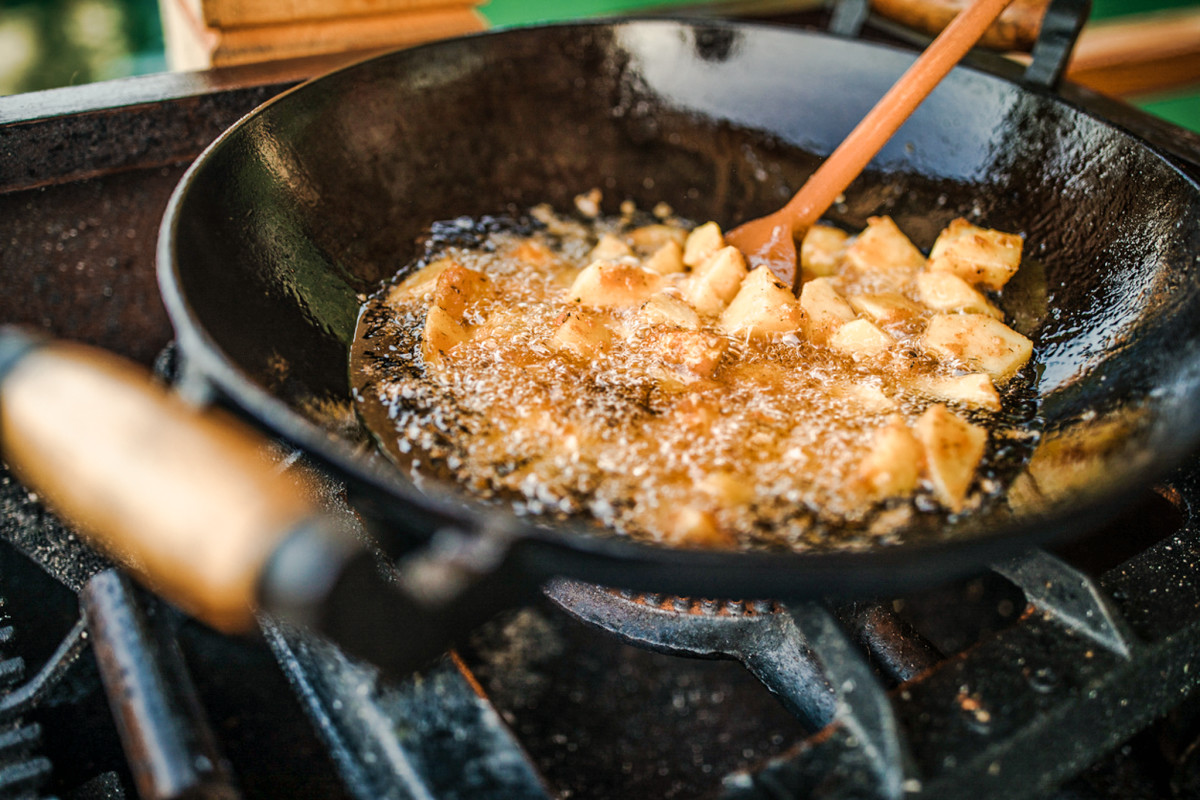
Are Seed Oils Toxic? The Latest Research Suggests Yes
Seed oils never underwent safety testing for premarket approval. Here, we examine the disturbing toxicity and safety data that have come to light recently.

